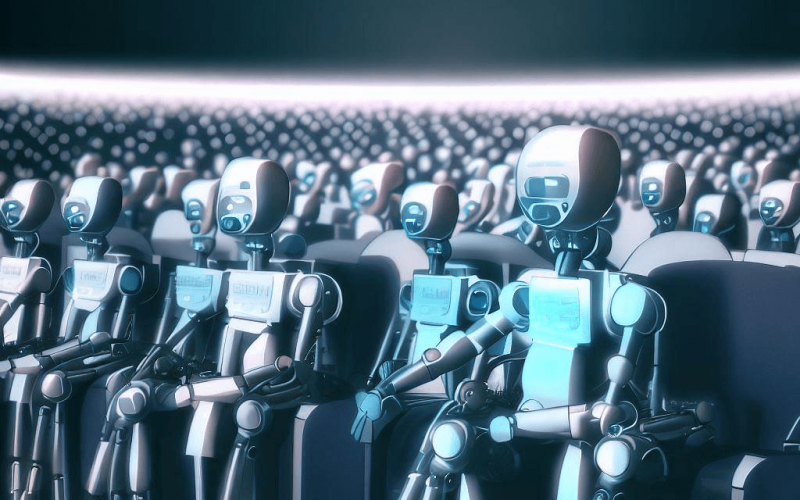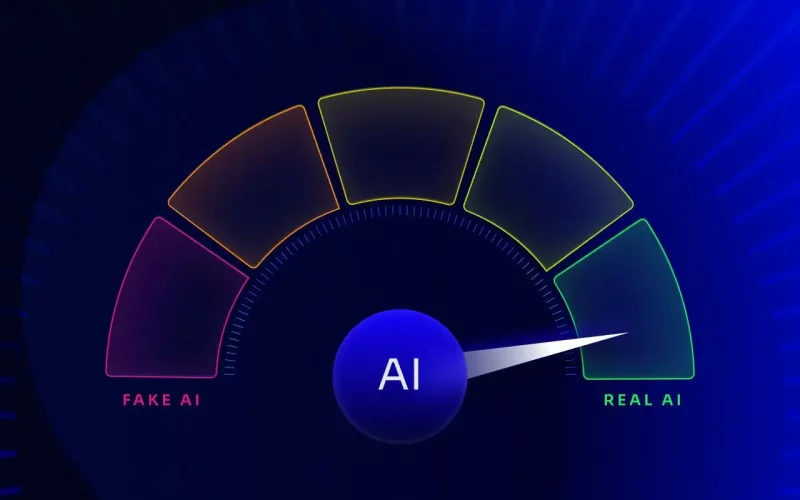
02 Jun AI-Washing: Artificial-Artificial Intelligence?
AI-Washing: Artificial-Artificial Intelligence?
If you’ve been following the headlines of the past few years, especially in the field of technology, you may have noticed how prominently artificial intelligence (AI) has been featured in news headlines. Since AI is a topic that most people don’t have in-depth knowledge about, it evokes a sense of mystery and cutting-edge technology, which is why many companies use the term AI as a marketing term. However, this usage can be misleading depending on the context. In order to inform you about this, we have prepared the following text.
What is “real artificial intelligence”?
While there are multiple definitions, according to Oxford, artificial intelligence refers to a machine performing tasks that would normally require human intelligence. This definition is quite broad and can be understood differently by different individuals. As AI advances, applications that were previously considered AI are no longer perceived as such by humans. This is because the more people understand the workings of a machine, the more they classify its tasks as “not requiring intelligence.” This phenomenon is known as the AI effect, and chess bots provide a good example. In 1997, when DeepBlue defeated the world chess champion, it was noted in editorials that DeepBlue calculated potential moves instead of thinking like a human, thus not being “real artificial intelligence.” However, if you look at the general definition of AI, even simple rule-based systems can be considered artificial intelligence as long as they mimic human intelligence.
What is AI-washing?
Artificial intelligence has become a hot topic in everyone’s agenda, given its advancements in the field as one of the rising technologies of our time. The term AI-washing refers to companies using the concept of artificial intelligence for marketing purposes in a deceptive manner, aiming to reach larger audiences. This term is derived from “greenwashing,” which describes companies that try to appear environmentally friendly without actually making any significant impact. As AI becomes more popular, AI-washing affects an increasing number of people.

Why do companies engage in AI-washing?
Companies engaging in AI-washing take advantage of the excitement artificial intelligence applications generate in today’s society, as well as the perception of this technology as the latest and superior innovation. This is not a new phenomenon; a research conducted by Forbes in 2019 on over 3,000 startups from 13 countries revealed that companies using the name “artificial intelligence” received 15% to 50% more investment compared to those that did not use the term. In other words, using the term AI directly affects the amount of investment companies receive. Additionally, in Europe, 40% of startups self-identifying as AI companies do not use artificial intelligence at any stage, and the mention of AI is absent in any content or product they produce.

How is artificial intelligence falsely marketed?
With the fuzzy definition of artificial intelligence, things can get even more confusing when marketing terms like “AI-powered,” “AI-driven,” or “AI-enhanced” are thrown into the mix. Companies can use artificial intelligence in areas that don’t directly impact their customers, such as having a smart coffee machine in their office, and still claim, “We use artificial intelligence.” Therefore, it’s important to understand in which areas a company is utilizing artificial intelligence. Additionally, it’s worth noting that in the past, there have been cases where companies marketed their products as “artificial intelligence” while the services were actually provided by humans (see Pseudo AI).
How to avoid AI-washing?
In a recent blog post, the Federal Trade Commission (FTC), the American trade regulatory body, discussed this issue and revealed the questions they ask during their investigations:
- Are the product’s capabilities exaggerated?
The FTC warns that claims about artificial intelligence having capabilities beyond today’s technology can be misleading. It is recommended to exercise caution when encountering such claims.
- Is it claimed that a product using artificial intelligence is superior to AI-less alternatives?
While such claims are often made under the umbrella of artificial intelligence to make a product more appealing, there should be evidence to support these claims.
- Does the product genuinely use artificial intelligence?
Since artificial intelligence is a broad term, companies using these words in their product descriptions may not always be accurate. During its investigations, the FTC examines whether products are truly “AI-powered” or “products that use artificial intelligence” as claimed.

